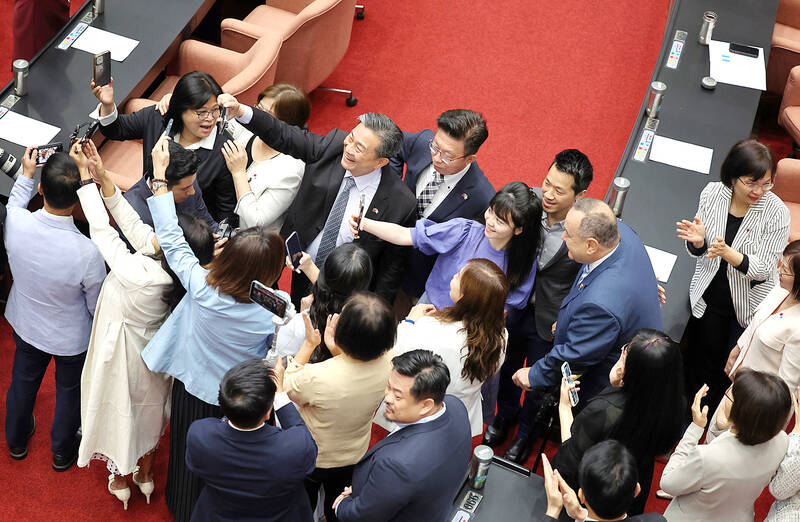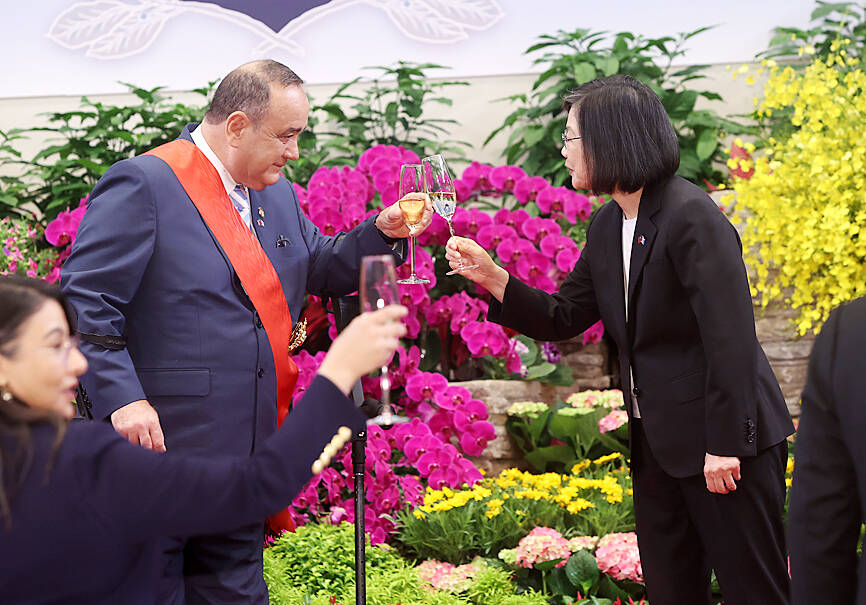The international community should support Taiwan in the face of threats from China, visiting Guatemalan President Alejandro Giammattei told the legislature in Taipei yesterday.
Giammattei, in a speech that made him the first head of state to address the legislature in 13 years, called on the international community and “the free world” to rally in support of Taiwan, which he said had long faced threats from across the Taiwan Strait.
Guatemala’s position has been to recognize and support the Republic of China (ROC) as an independent nation, Giammattei said.

Photo: CNA
He also underscored what he described as the importance of the international community respecting Taiwan’s sovereignty and territorial integrity.
The 67-year-old president added that his current visit at the head of an official delegation was a testament to Guatemala’s opposition to “foreign aggression.”
Giammattei’s visit to Taiwan comes just weeks after President Tsai Ing-wen (蔡英文) traveled to Guatemala as part of her 10-day overseas trip and one month after another Central American nation, Honduras, switched diplomatic recognition from Taipei to Beijing.

Photo: CNA
Giammattei said that while other nations had placed interests above friendship and changed allegiances, Guatemala, which established diplomatic relations with the ROC in 1933, remained committed to Taiwan.
Describing Taiwan as a longstanding strategic partner of Guatemala, Giammattei pledged to continue promoting the bilateral relationship between the two nations.
He also expressed gratitude for the Taiwanese government’s financial support for Guatemala over the years, including an estimated US$90 million in aid between 2013 and 2021, as well as scholarships given to young Guatemalans to study in Taiwan.
His speech, which was met with a standing ovation from lawmakers across party lines, was praised by Legislative Speaker You Si-kun (游錫?) as “significant” at a time when “the expansion of authoritarianism has shrunk the space for democracies” in the world.
You also conferred an honorary medal on Giammattei in recognition of his contributions to “the promotion of friendship and cooperation between Taiwan and Guatemala.”
Giammattei in the morning was welcomed by Tsai with a military salute at the Presidential Office Building.
The two held bilateral talks later in the afternoon, during which Tsai conferred upon Giammattei the Order of Brilliant Jade with Grand Cordon in recognition of his contributions to the friendship between the two nations.
Tsai said that Taiwan and Guatemala had weathered the COVID-19 pandemic together, and are continuing to deepen cooperation in areas including economic affairs, public healthcare and medicine, culture and education.
Giammattei said that the alliance between the two nations is founded on a shared belief in mutual respect and support, upholding national sovereignty and the pursuit of democracy.
The nations’ bilateral relationship is based on proactive, steady and long-term diplomatic engagement and broad cooperation, rather than “frivolous diplomatic language,” he said.
He concluded his remarks by saying: “Long live free, sovereign and democratic Taiwan.”
Giammattei arrived in Taiwan on Monday for a four-day visit that includes meetings with government officials, Guatemalan students and representatives from Taiwanese companies present in the Central American nation.
The delegation includes Guatemalan Congressional President Shirley Joanna Rivera Zaldana, Minister of Foreign Affairs Mario Adolfo Bucaro Flores and Minister of Economy Janio Moacyr Rosales Alegria.
Additional reporting by Kayleigh Madjar

DAREDEVIL: Honnold said it had always been a dream of his to climb Taipei 101, while a Netflix producer said the skyscraper was ‘a real icon of this country’ US climber Alex Honnold yesterday took on Taiwan’s tallest building, becoming the first person to scale Taipei 101 without a rope, harness or safety net. Hundreds of spectators gathered at the base of the 101-story skyscraper to watch Honnold, 40, embark on his daredevil feat, which was also broadcast live on Netflix. Dressed in a red T-shirt and yellow custom-made climbing shoes, Honnold swiftly moved up the southeast face of the glass and steel building. At one point, he stepped onto a platform midway up to wave down at fans and onlookers who were taking photos. People watching from inside

A Vietnamese migrant worker yesterday won NT$12 million (US$379,627) on a Lunar New Year scratch card in Kaohsiung as part of Taiwan Lottery Co’s (台灣彩券) “NT$12 Million Grand Fortune” (1200萬大吉利) game. The man was the first top-prize winner of the new game launched on Jan. 6 to mark the Lunar New Year. Three Vietnamese migrant workers visited a Taiwan Lottery shop on Xinyue Street in Kaohsiung’s Gangshan District (崗山), a store representative said. The player bought multiple tickets and, after winning nothing, held the final lottery ticket in one hand and rubbed the store’s statue of the Maitreya Buddha’s belly with the other,

‘COMMITTED TO DETERRENCE’: Washington would stand by its allies, but it can only help as much as countries help themselves, Raymond Greene said The US is committed to deterrence in the first island chain, but it should not bear the burden alone, as “freedom is not free,” American Institute in Taiwan Director Raymond Greene said in a speech at the Institute for National Defense and Security Research’s “Strengthening Resilience: Defense as the Engine of Development” seminar in Taipei yesterday. In the speech, titled “Investing Together and a Secure and Prosperous Future,” Greene highlighted the contributions of US President Donald Trump’s administration to Taiwan’s defense efforts, including the establishment of supply chains for drones and autonomous systems, offers of security assistance and the expansion of

Japan’s strategic alliance with the US would collapse if Tokyo were to turn away from a conflict in Taiwan, Japanese Prime Minister Sanae Takaichi said yesterday, but distanced herself from previous comments that suggested a possible military response in such an event. Takaichi expressed her latest views on a nationally broadcast TV program late on Monday, where an opposition party leader criticized her for igniting tensions with China with the earlier remarks. Ties between Japan and China have sunk to the worst level in years after Takaichi said in November that a hypothetical Chinese attack on Taiwan could bring about a Japanese